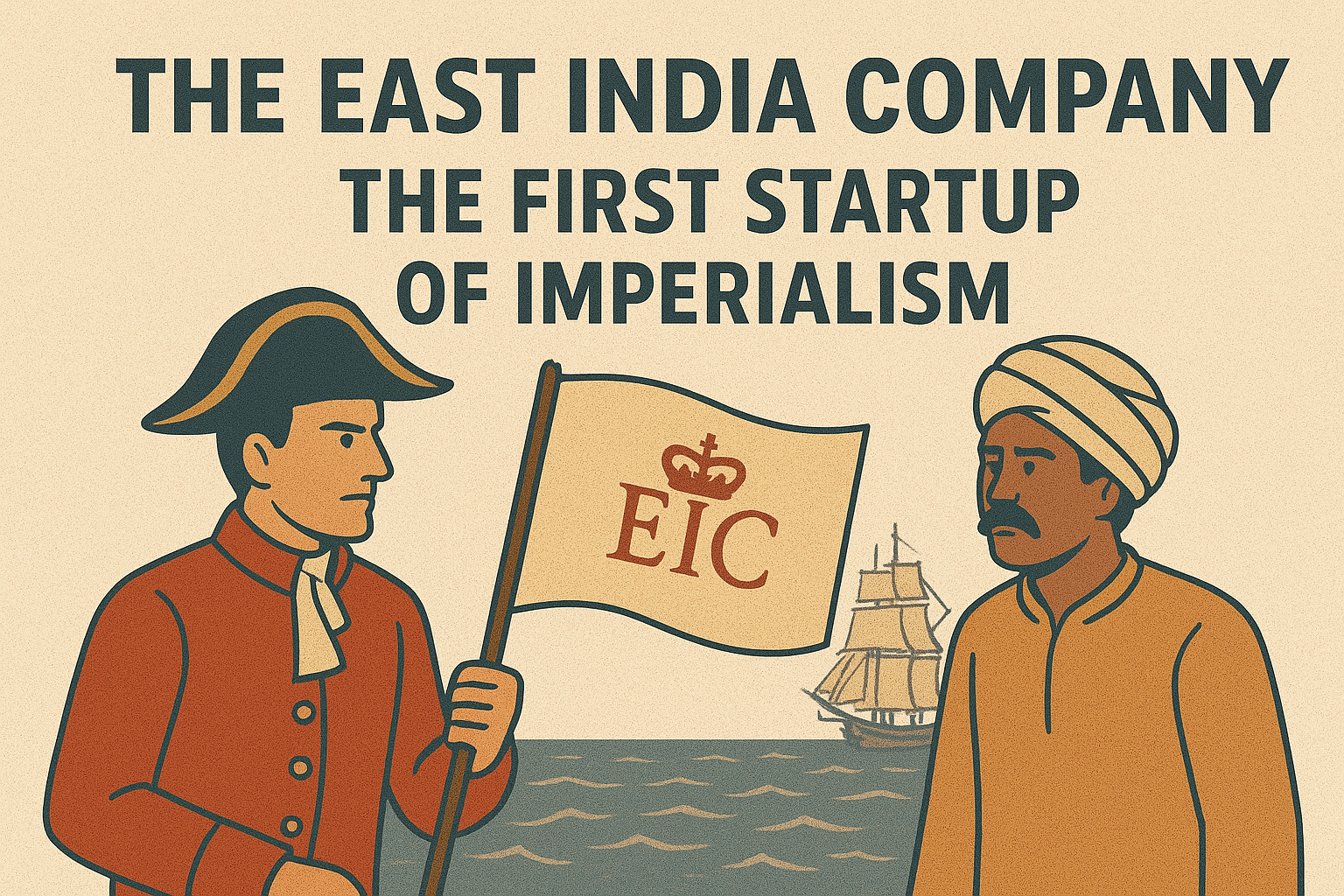
The East India Company (EIC) is often hailed as a groundbreaking entity in the realm of trade and commerce. However, its significance extends far beyond mere economic activities; it can be viewed as the first "startup" of imperialism, blending entrepreneurial zeal with colonial ambition. This article explores how the EIC exemplifies the startup model of innovation, risk-taking, and market disruption, while simultaneously laying the groundwork for imperialism in the modern world.
The Birth of an Entrepreneurial Venture
Founded in 1600 by a group of London merchants, the East India Company began as a small trading venture focused on accessing the lucrative markets of Asia. At the time, European powers were vying for control over trade routes to access spices, silk, and other exotic goods. With a royal charter from Queen Elizabeth I, the EIC was granted exclusive rights to trade in the East Indies, positioning it at the forefront of economic opportunity.
This foundational moment mirrors the typical startup narrative today: a group of entrepreneurs identifies a market gap and takes calculated risks to capitalize on it. The EIC's initial focus was on importing spices from the East Indies, but its entrepreneurial spirit quickly led to diversification into textiles, tea, and other commodities, thus expanding its business model and revenue streams.
Innovative Business Strategies
What truly set the East India Company apart as an early imperialist startup was its innovative approach to business. The EIC established trading posts and factories in key locations across Asia, including Surat, Madras, and Calcutta. This network not only facilitated trade but also enabled the company to maintain a foothold in the region.
In its quest for growth, the EIC adopted practices akin to modern corporate strategies. It negotiated treaties with local rulers, entered joint ventures, and employed a mix of diplomacy and military force to secure its interests. By leveraging local alliances and adapting to regional dynamics, the EIC was able to establish a dominant position in the market. This approach showcases the importance of strategic partnerships in the startup ecosystem, where collaboration can drive expansion and success.
The Dual Role: Trade and Governance
The East India Company’s unique model involved a dual role as both a commercial enterprise and a governing authority. Unlike contemporary startups that operate strictly within legal frameworks, the EIC wielded considerable political power. It maintained its own army, enacted laws, and collected taxes, effectively functioning as a quasi-governmental entity.
This blend of commerce and governance laid the foundation for a new form of imperialism. The EIC's ability to enforce its interests through military might and political influence transformed it from a mere trading company into a formidable power. It was this capacity to govern that differentiated the EIC from other trading companies of the time, allowing it to expand its reach and control over vast territories.
Economic Catalyst: The Impact of Industrialization
The Industrial Revolution in the 18th century served as a catalyst for the East India Company’s expansion. The growing demand for raw materials to fuel British industries created a symbiotic relationship between the EIC and the burgeoning industrial economy. The company became the primary supplier of essential commodities, such as cotton and tea, integrating itself into the very fabric of Britain’s industrial success.
This dynamic illustrates how startups can catalyze broader economic transformations. The EIC not only contributed to the wealth of its shareholders but also played a critical role in shaping Britain’s economy during a pivotal period of industrial growth. By ensuring a steady supply of goods from India, the company helped position Britain as a global industrial leader.
Resistance and Overreach
Despite its initial successes, the East India Company’s overreach and exploitative practices eventually led to widespread resentment among the local population. The imposition of high taxes, unfair trade practices, and cultural insensitivity sparked significant resistance. The Sepoy Mutiny of 1857 marked a crucial turning point, as Indian soldiers rose against the company’s oppressive policies.
This uprising compelled the British government to reassess its approach, ultimately leading to the dissolution of the East India Company in 1874 and the establishment of direct British rule over India. The EIC's downfall underscores a critical lesson for startups: unchecked ambition and a disregard for ethical considerations can lead to significant backlash and failure.
Legacy and Lessons for Modern Startups
The legacy of the East India Company is multifaceted. While it facilitated economic exchange and cultural interactions between East and West, its imperialistic ambitions wrought considerable social and economic upheaval in India. The exploitation of resources and the imposition of foreign governance led to long-lasting consequences that continue to resonate today.
In contemporary discussions, the EIC serves as a cautionary tale for modern startups. Its story illustrates the delicate balance between ambition and ethical responsibility. As entrepreneurs navigate today’s complex global landscape, the lessons drawn from the EIC's rise and fall emphasize the importance of sustainable practices and respect for local cultures.
Final Take
The East India Company stands as a seminal example of the fusion of commerce and imperialism, embodying the characteristics of a pioneering startup. Its journey from a small trading company to a powerful force of imperial expansion reflects the intricate relationship between economic motivations and political actions. As we study the EIC, we gain valuable insights into the responsibilities that accompany power and the profound impact of economic pursuits on global societies. Understanding this history not only enriches our comprehension of imperialism but also informs our approach to entrepreneurship in an interconnected world.





















